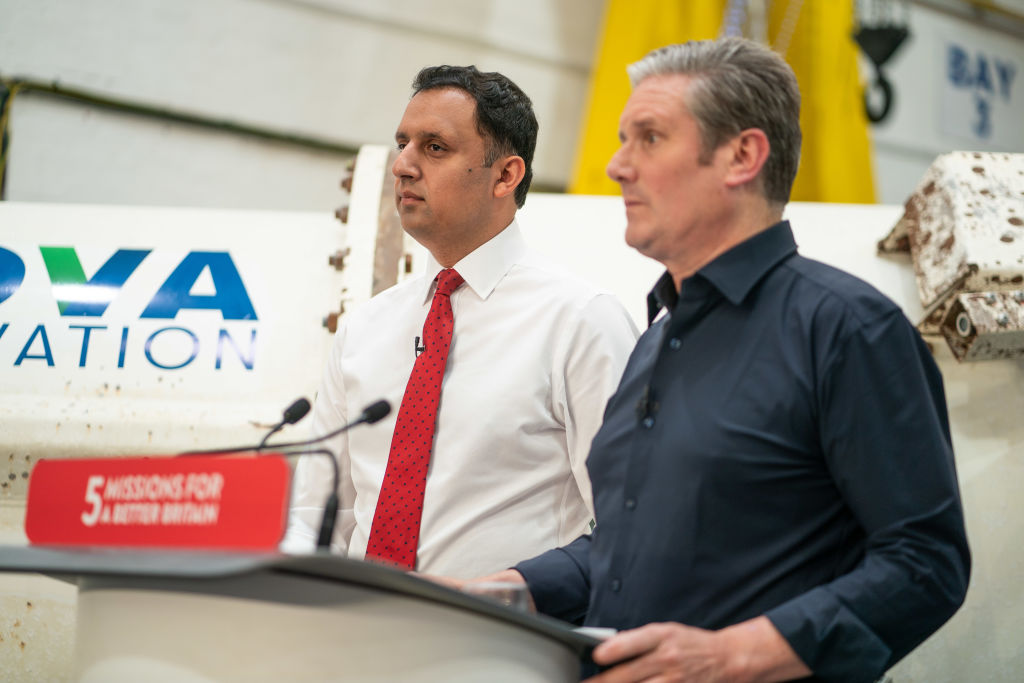Members of the Scottish Labour party may be forgiven for feelings of jubilation following publication of a new poll. Sir Keir Starmer arrived in Leith near Edinburgh this morning to be met by comrades cheered by the suggestion their party is on course to defeat the SNP at a general election for the first time since 2010.
A Panelbase poll for the Sunday Times has Labour winning 26 of Scotland’s 59 seats and the nationalists just 21. Given that Labour took only one seat in Scotland in 2019 while the SNP won 48, this would mark quite the reversal of fortunes. But Labour supporters who believe this poll signals the beginning of the end for the SNP’s political dominance in Scotland would be wise to insert a degree of caution into their analysis.
From the day the Scottish parliament opened in 1999, senior Labour figures at Westminster (most notably Gordon Brown) meddled in policy, undermining colleagues at Holyrood.
The truth is that a viable Labour party was always going to make life tricky for the nationalists in general elections. Whenever it has appeared the Conservatives are on course to win, the SNP’s message that only independence could rid Scotland of ‘unelected’ Tory governments has resonated loudly and clearly. In 2019, it was perfectly obvious to anyone paying the slightest attention to events that Boris Johnson’s Tories would thrash Jeremy Corbyn’s Labour party. This meant a handsome dividend for the SNP. Now that Labour looks likely to win the next general election, it’s hardly surprising that many Scots wish to play their part in the defeat of the Tories. However, many of those same voters will, I think, be content to return to the SNP fold at the next Holyrood election in 2026.
Join me, why don’t you, in my time machine. Back in the foreign country of 2007, Alex Salmond led the SNP to its first Scottish parliamentary election victory despite support for independence polling in the high 20s. Little more than a quarter of Scots then reckoned the break-up of the United Kingdom a good idea but many more bought into the concept that the SNP was fully committed to the needs and priorities of Scotland.
Scottish Labour, on the other hand, was seen as little more than a ‘branch office’ of the UK party. This perception was not unreasonable. From the day the Scottish parliament opened in 1999, senior Labour figures at Westminster (most notably Gordon Brown) meddled in policy, undermining colleagues at Holyrood.
Back to the present day, current Scottish Labour leader Anas Sarwar – smart and affable though he may be – still faces the challenge of persuading Scottish voters that he is very much his own man and not merely a branch manager. Breaking this perception may require radical steps.
First Minister Humza Yousaf may be something of a political lightweight in comparison to his predecessors Nicola Sturgeon and Alex Salmond but when he tells voters his party’s policies are created in Scotland, by Scots for Scots, he speaks the truth. When Sarwar makes similar claims, doubts linger. Is he really free of the influence of the UK party? And if he cannot convincingly persuade Scottish voters of this, will he really be able to win the country over in the next Holyrood election?
A strong case can be made for the breaking away of Scottish Labour from the UK party to become an entirely discrete entity, if Sarwar is serious about kicking the SNP out of government. As leader of a sister party to Labour in England and Wales, Sarwar might once and for all put an end to the compelling accusation that he, like all of his predecessors, is little more than a puppet of his Westminster ‘masters’. Scottish voters may not yet be ready to vote for independence but the idea that politicians in London might be undermining those running the show in Edinburgh pushes the buttons of even those who support the Union.
If Sarwar cannot convince voters that his party operates free from the influence of the party at Westminster, many of those Scots who are ready to back Keir Starmer for PM will simply return to the SNP when it comes to choosing the next government at Holyrood. Scottish Labour cannot relax just yet.







Comments